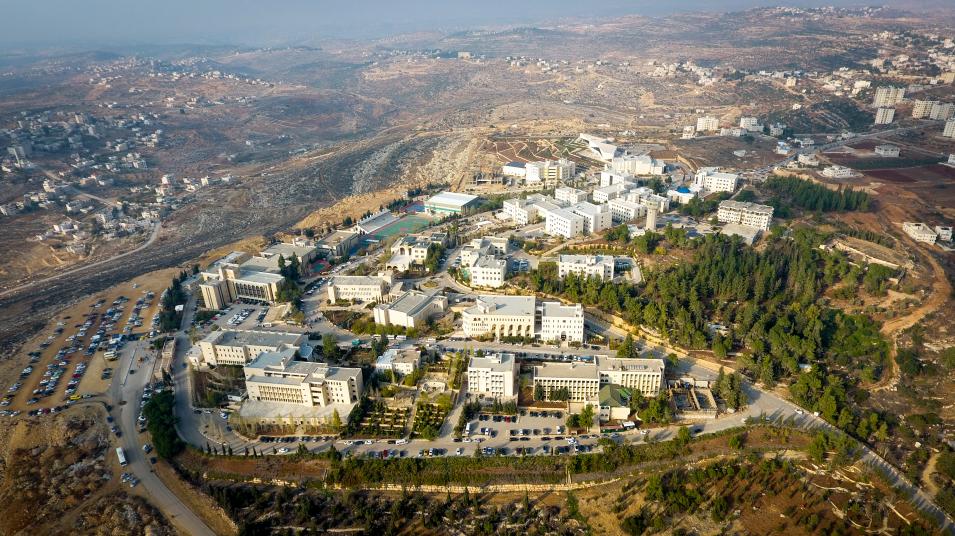Constitutional law professor delves into justiciability, enforcement of economic and social rights in Palestinian Basic Law
Asem Khalil, Birzeit University’s vice president for community affairs and H.H. Shaikh Hamad Bin Khalifa Al-Thani Professor of Constitutional and International Law, has recently published a paper in which he explores whether economic and social rights (ESR) are recognized as fundamental rights in the Palestinian constitution and probes the extent to which specialized courts can adjudicate matters related to those rights.
Having presented an overview of the ESRs established in the Palestinian Authority’s Basic Law – which include the right to work or the right to education – Khalil discusses to what extent their entrenchment in the Palestinian constitutional text allows courts such as the Supreme Constitutional Court (SCC) that was established in 2006 and the High Court (its functional predecessor) to interpret and enforce them.
Entitled “Courting Economic and Social Rights in Palestine: Justiciability, Enforceability and the Role of the Supreme Constitutional Court,” the paper focuses on the legal concept of justiciability – the extent to which a court has the ability to adjudicate on certain matters – of ESRs in Palestine and examines whether such adjudication and enforcement are feasible within the Palestinian political, legal, and social contexts.
This matter, as Khalil notes in the paper, has far-reaching implications that affect Palestinians’ right to work, education, and housing, among others. He highlights two cases: a protest staged by teachers over their working conditions – which fueled a public debate on the rights to work, to freedom of movement, and to freedom of expression in the Palestinian Basic Law – and a 2016 protest declared by private-sector workers over the law on social security that at the time had been decreed recently.
Such legal disputes, Khalil argues, could be mitigated if the SCC were to take on a more active role in such cases. He asserts that such involvement is an act afforded by an interpretation of the Basic Law that recognizes that some ESRs are considered as amenable to adjudication by the relevant specialized court.
To support his argument, Khalil invites the reader to “suppose that [the] public school teachers, or the workers in the private sector, or their representatives had actually decided to approach the SCC, advancing the complaint that the government’s actions in the two relevant instances are unconstitutional because they undermine constitutional and employment rights.”
Khalil follows up with the consideration that “In addressing ourselves to this hypothetical scenario, we should begin by enquiring as to the arguments that can be made with regard to the justiciability of ESRs in Palestine; … [and] then consider their application to the working context. This leads us to ask the following questions: Do public school teachers have a fundamental right to fair wages and a right to adequate standard of living? Do workers in [the] private sector have a right to social security? How can a fair regulation of those matters be decided, and what is the balance between the workers’ and the employers’ needs on the one side, and the government’s available resources on the other?”
ERSs in the Palestinian Basic Law
Khalil details the different ESRs included in the Palestinian constitution and the legal status afforded to each one of them. The constitution, he argues, recognizes the rights to form trade or workers’ unions, to strike, to an adequate standard of living, rest and leisure, a safe and healthy work environment, employment-related social security, social security for all citizens (not work-related), to property, and to housing. It deems them aspirational rights, that is, they provide guidelines for the government and the legislator.
The rights of children and the right to education, however, are presented in the Palestinian constitution as justiciable – amenable to adjudication – whereas five rights usually present in the constitution of other countries are omitted: the right to fair wage, the right to health, the right to financial support for vulnerable groups, the right to food, and the right to water.
Khalil notes that the Palestinian Basic Law’s mixture of justiciable and aspirational rights is found in several other countries in the Middle East and North Africa as well.
As to who interprets rights in the Palestinian constitution as justiciable or aspirational, Khalil explains that the Palestinian Basic Law has vested that power in the SCC – among other powers such as the jurisdiction to review legislation and government’s actions and to determine the “source of ‘constitutionality’” with regards to ESRs. That is, the SCC has the mandate to rule on the constitutionality of a right by consulting sources other than the Palestinian Basic Law.
Justiciability and enforcement of ESRs in Palestine
While Khalil contends that some ESRs are not included in the Palestinian Basic Law and that the text of the constitution can be construed in a fashion that favors aspirational rights, he presents several ways through which justiciable ESRs can be enforced in Palestine. These include directly enforcing ESRs that are entrenched in the constitution, indirectly connecting them to civil and political rights, or making reference to the equality clause (Article 9 of the constitution); using the general reference to Human Rights in Article 10 of the Basic Law, making use of the obligation to respect and uphold internationally recognized rights; using international law – the 2014 ratification of International Covenant on Economic, Social and Cultural Rights by Palestine allows for this method; negatively enforcing ESRs by reviewing actions undertaken by the Palestinian Authority and ordering the government to refrain from hindering the satisfaction of ESRs; and enforcing ESRs on an individual basis, thereby providing justice in specific instances and avoiding large-scale policy interventions that could potentially impact the public budget.







